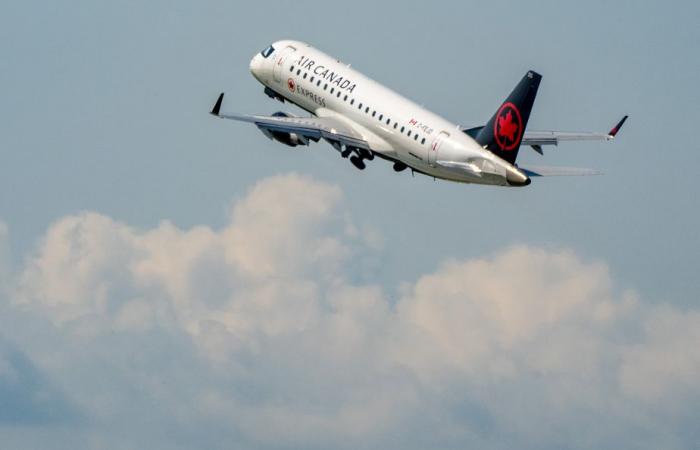Air Canada shares closed up nearly 14% on Friday after announcing a share buyback program, higher-than-expected profits and an upwardly revised earnings outlook.
Posted at 8:21 a.m.
Updated at 4:30 p.m.
Ian Bickis
The Canadian Press
These positives come despite a turbulent third quarter, during which negotiations over the pilots’ collective bargaining agreement created uncertainty for travelers and contributed to lower revenues and passenger volumes.
The new contract with pilots, which includes a cumulative pay increase of 42% over four years, is expected to put pressure on spending next year, but President and CEO Michael Rousseau argued that it was a significant achievement to have reached an agreement without a pilots’ strike.
“I am proud that we have reached a mutually beneficial agreement with no significant disruption to customers and limited impact on revenue,” he said during an earnings conference call Friday.
PHOTO ALAIN ROBERGE, THE PRESS
Air Canada President and CEO Michael Rousseau
The risk of travel disruptions offset a long-term growth trend and led to a 0.1% decline in passenger volume, while revenues fell 4% to 6.11 billion.
“We experienced several weeks of lower booking volumes as some customers postponed or canceled their itineraries while others chose to fly with other carriers,” said Mark Galardo, executive vice president of revenue and network planning during the conference call.
Profits were also affected by competitive market pressure, as well as weaker demand to France due to the Olympics, but Mr Galardo said overall the airline saw strong international demand sustained during the quarter.
The airline posted a profit of 2.04 billion, up from 1.25 billion in the same quarter last year, although this figure was significantly boosted by a one-off income tax recovery of 1.15 billion during the quarter.
On an adjusted basis, Air Canada earned $2.57 per share, down from $3.41 per share a year ago. The adjusted profit, however, was well above the $1.58 per share expected by analysts, according to LSEG Data & Analytics.
The profit beat consensus on fuel and costs, noted RBC analyst James McGarragle.
Several elements to follow
The airline also slightly raised its profit forecast for 2024, with adjusted earnings before interest, taxes, depreciation and amortization expected to total around 3.5 billion, compared to earlier forecasts of between 3.1 and 3.4 billion.
Air Canada also announced a share buyback program covering about 10% of outstanding shares, which it said is aimed at countering some of the stock dilution the airline has suffered during the pandemic.
The combination of this news helped send Air Canada’s stock up $2.64, or 13.99%, to $21.51 on the Toronto Stock Exchange.
In its outlook, the airline said it now expects its capacity measured in available seat miles for 2024 to be up about 5% from 2023, representing a decline from to previous growth expectations of 5.5% to 6.5%.
Mr Galardo said the reduction was due to a combination of supply chain pressures, aircraft availability and geopolitical pressures, while the airline will examine whether other factors are lowering demand.
“Although demand is strong, we will monitor the effects of rising hotel costs and exchange rates which could impact the upcoming winter season,” he said.
Air Canada also expects its adjusted cost per available seat mile to increase by approximately 2% compared to 2023, compared to previous forecasts of growth of 2.5% to 3.5%.







